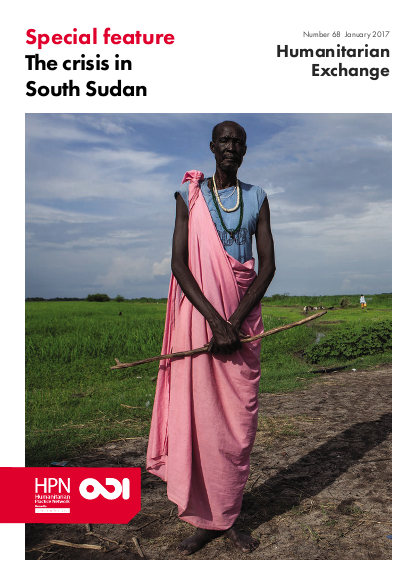Humanitarian Exchange | #68

In May 2013 we published an edition of the Humanitarian Exchange entitled ‘South Sudan at a crossroads’. Despite the challenges facing the world’s newest state, the tone was optimistic. Following the outbreak of conflict in December 2013, that sense of hope has turned to shock and despair: more than 3 million people have been displaced and almost 5m are food insecure; the UN Mission in South Sudan (UNMISS) has failed to stem violence against civilians, and the country has become one of the world’s most dangerous places for aid work.
- In the lead article in this edition on the South Sudan crisis, Eddie Thomas and Natalia Chan admit that the prospects for 2017 are bleak, but also encourage the international community to identify and nurture ‘spaces for hope’, such as schools, health centres and civic peace initiatives.
- Freddie Carver likewise emphasises the need to work with local institutions to build peace.
- UNMISS is the focus of articles by Julien Schopp, Matt Wells and Caelin Briggs, who look at the unintended consequences of the Level 3 designation applied to the crisis, the mixed record of UN peacekeeping and the impact of Protection of Civilian sites on the protection environment.
- Tiffany Easthom reflects on Nonviolent Peaceforce’s approach to protection.
- Lydia Stone highlights the pervasive problem of sexual violence against women and girls.
- Lindsay Hamsik analyses the impact of government regulation on NGO activities.
- Adele Harmer and Monica Czwarno describe the paralysing effects of violence on aid work.
- Lydia Tanner and colleagues examine the role of national actors in the humanitarian response.
- Jeremiah Young discusses World Vision’s experience of scaling up in response to a spike in violence in the capital in July 2016.
- Laura Jones describes the development and use of Survival Kits to provide short-term assistance to displaced people.
- Emma van der Meulen and Akuja de Garang report on an innovative approach to promoting girls’ education.
- Andreas Kiaby reflects on the use of cash programming during the conflict.
- The edition ends with an article by Detlef Barth and Matthias Oesterle on the German government’s efforts to promote agricultural production through Lead Farmer Field Schools and voucher provision.
